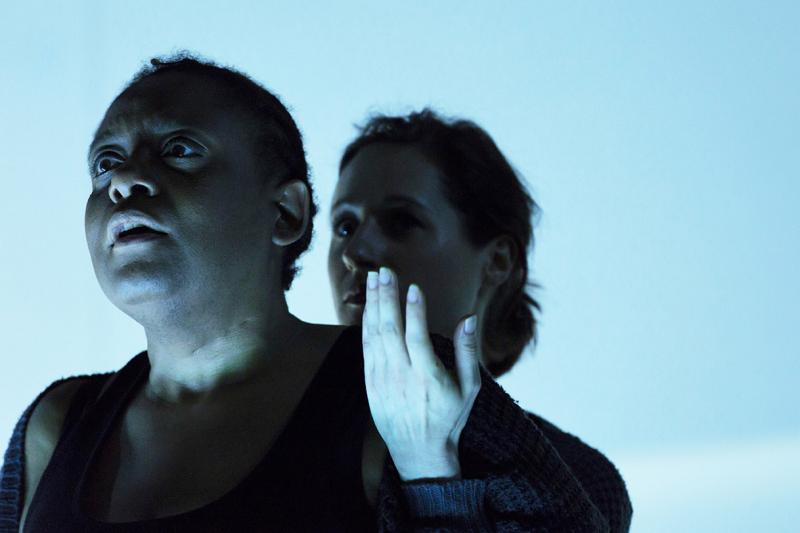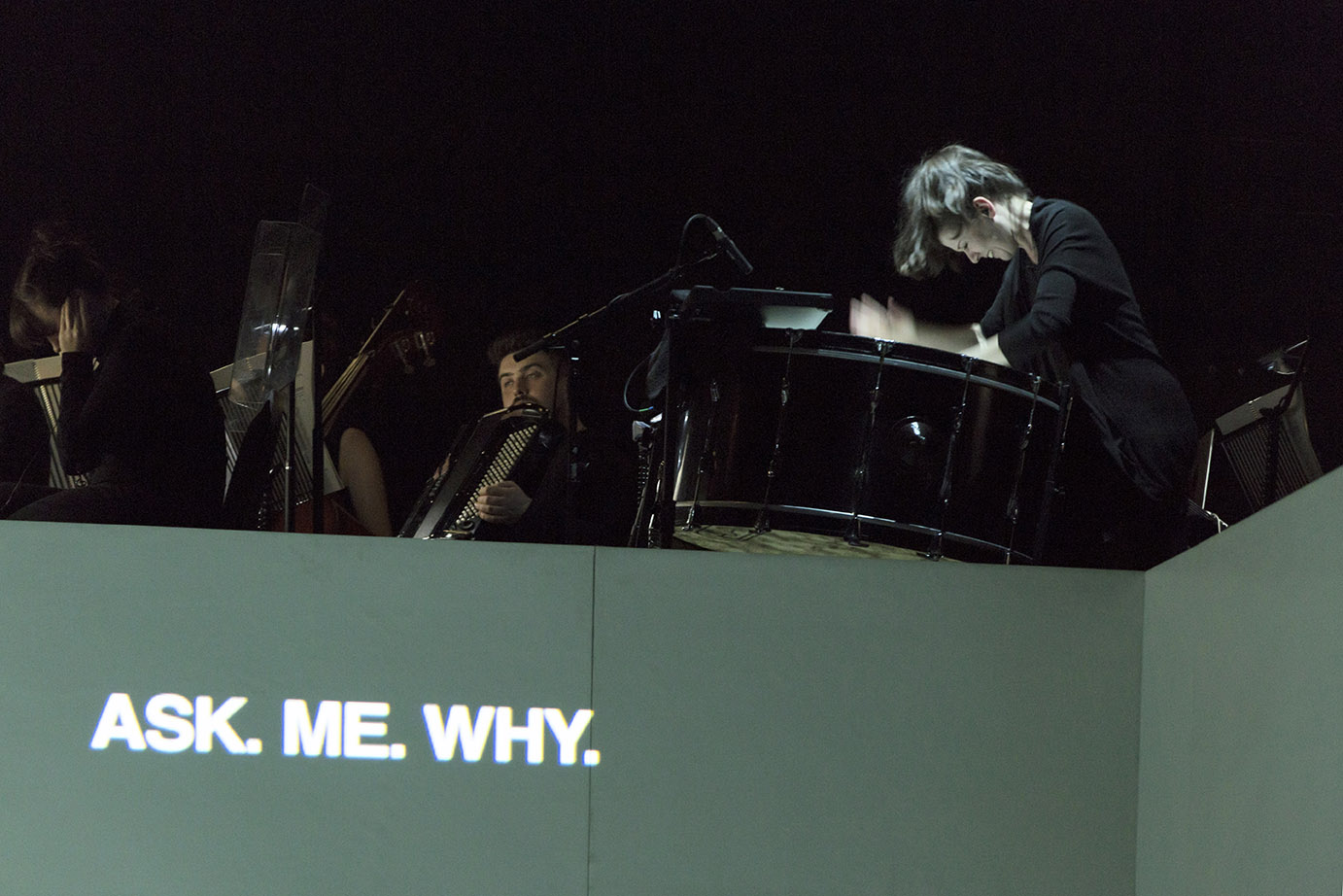4 48 Psychosis, Royal Opera, Lyric Hammersmith review - despairing truth in song and speech | reviews, news & interviews
4.48 Psychosis, Royal Opera, Lyric Hammersmith review - despairing truth in song and speech
4.48 Psychosis, Royal Opera, Lyric Hammersmith review - despairing truth in song and speech
Philip Venables' opera is now as classic as the Sarah Kane drama it sets

Depression, with or without psychotic episodes, is a rare subject for drama or music theatre - and with good reason: the sheer unrelenting monotony of anguish and self-absorption is hard to reproduce within a concentrated time-span.
Masterpiece or not, 4.48 Psychosis the opera is a very rare case of the music reflecting what could be an overpowering text at every point. Kane's words by themselves will always be the richer option because of their total authenticity, even in the occasional bathos and banality. Some of Venables' sequences sound a bit more generic - the slow-burn meshing of his six female voices, for instance, brilliant idea though it was to have them represent aspects of the undoubted protagonist, sufferer, patient, call her what you will - the utterly convincing Gweneth-Ann Rand (pictured above), as before. Others add a layer to Kane's writing and can be hair-raising, not least the fast passages involving numbers and lists; difficult to catch all the amplified words here when they're not flashed up as text on the back wall, but the fizzing textures are the thing, with bending string lines and shrieking woodwind (flute/piccolo and three saxophones), Birtwistle-style, from the hard-working CHROMA under Richard Baker.

The visionary hour around 4.48am inspires music for a black-and-white mass. Most riveting of all is the dialogue between (we assume) patient and psychiatrist which launches the work - as a monologue since one of the two remains silent - and is, perhaps, its only developmental strand. CHROMA's two percussionists, Louise Goodwin (pictured above), beat out the speech-rhythms on bass drum and other hard-hitting instruments against dribbling recorded muzak while the text is seen below. It's as if the protagonist is under water in her isolation, and barely hearing properly; towards the end, mezzo Lucy Schaufer begins to articulate the psychiatrist's words. It's moving; there is professional help here, but the main character (Kane, surely) is beyond it.
It's not always easy to work out who's singing what; given the non-directional miking and the darker lighting in D.M. Wood's palette on Hannah Clark's set, but Susanna Hurrell excels as a more companionable self and there's fine ensemble work from newcomers to the production - I presume, since the characters' names seem to be those of the original singers - Lucy Hall, Samantha Price and Rachel Lloyd. Director Ted Huffman overcomes the problem of a specific location for a totally unspecific text - a room with a glass door, table and chairs - by drawing variety parallel to Kane and Venables from his team and video designer Pierre Martin. Not easy listening and watching, then, but decidedly a confirmation of a classic.
rating
Share this article
The future of Arts Journalism
You can stop theartsdesk.com closing!
We urgently need financing to survive. Our fundraising drive has thus far raised £49,000 but we need to reach £100,000 or we will be forced to close. Please contribute here: https://gofund.me/c3f6033d
And if you can forward this information to anyone who might assist, we’d be grateful.

Subscribe to theartsdesk.com
Thank you for continuing to read our work on theartsdesk.com. For unlimited access to every article in its entirety, including our archive of more than 15,000 pieces, we're asking for £5 per month or £40 per year. We feel it's a very good deal, and hope you do too.
To take a subscription now simply click here.
And if you're looking for that extra gift for a friend or family member, why not treat them to a theartsdesk.com gift subscription?
more Opera
 BBC Proms: The Marriage of Figaro, Glyndebourne Festival review - merriment and menace
Strong Proms transfer for a robust and affecting show
BBC Proms: The Marriage of Figaro, Glyndebourne Festival review - merriment and menace
Strong Proms transfer for a robust and affecting show
 BBC Proms: Suor Angelica, LSO, Pappano review - earthly passion, heavenly grief
A Sister to remember blesses Puccini's convent tragedy
BBC Proms: Suor Angelica, LSO, Pappano review - earthly passion, heavenly grief
A Sister to remember blesses Puccini's convent tragedy
 Orpheus and Eurydice, Opera Queensland/SCO, Edinburgh International Festival 2025 review - dazzling, but distracting
Eye-popping acrobatics don’t always assist in Gluck’s quest for operatic truth
Orpheus and Eurydice, Opera Queensland/SCO, Edinburgh International Festival 2025 review - dazzling, but distracting
Eye-popping acrobatics don’t always assist in Gluck’s quest for operatic truth
 MARS, Irish National Opera review - silly space oddity with fun stretches
Cast, orchestra and production give Jennifer Walshe’s bold collage their all
MARS, Irish National Opera review - silly space oddity with fun stretches
Cast, orchestra and production give Jennifer Walshe’s bold collage their all
 Káťa Kabanová, Glyndebourne review - emotional concentration in a salle modulable
Janáček superbly done through or in spite of the symbolism
Káťa Kabanová, Glyndebourne review - emotional concentration in a salle modulable
Janáček superbly done through or in spite of the symbolism
 Buxton International Festival 2025 review - a lavish offering of smaller-scale work
Allison Cook stands out in a fascinating integrated double bill of Bernstein and Poulenc
Buxton International Festival 2025 review - a lavish offering of smaller-scale work
Allison Cook stands out in a fascinating integrated double bill of Bernstein and Poulenc
 Tosca, Clonter Opera review - beauty and integrity in miniature
Happy surprises and a convincing interpretation of Puccini for today
Tosca, Clonter Opera review - beauty and integrity in miniature
Happy surprises and a convincing interpretation of Puccini for today
 Hamlet, Buxton International Festival review - how to re-imagine re-imagined Shakespeare
Music comes first in very 19th century, very Romantic, very French operatic creation
Hamlet, Buxton International Festival review - how to re-imagine re-imagined Shakespeare
Music comes first in very 19th century, very Romantic, very French operatic creation
 Falstaff, Glyndebourne review - knockabout and nostalgia in postwar Windsor
A fat knight to remember, and snappy stagecraft, overcome some tedious waits
Falstaff, Glyndebourne review - knockabout and nostalgia in postwar Windsor
A fat knight to remember, and snappy stagecraft, overcome some tedious waits
 Salome, LSO, Pappano, Barbican review - a partnership in a million
Asmik Grigorian is vocal perfection in league with a great conductor and orchestra
Salome, LSO, Pappano, Barbican review - a partnership in a million
Asmik Grigorian is vocal perfection in league with a great conductor and orchestra
 Semele, Royal Opera review - unholy smoke
Style comes and goes in a justifiably dark treatment of Handelian myth
Semele, Royal Opera review - unholy smoke
Style comes and goes in a justifiably dark treatment of Handelian myth
 Le nozze di Figaro, Glyndebourne review - perceptive humanity in period setting
Mostly glorious cast, sharp ideas, fussy conducting
Le nozze di Figaro, Glyndebourne review - perceptive humanity in period setting
Mostly glorious cast, sharp ideas, fussy conducting

Add comment